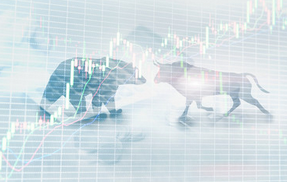Forex vs. Stocks: Trading Options, Leverage, Charges & more

Money lying in the bank account will always give low return because of the low interest rate offered by the bank. Therefore it is very essential to look for investment alternatives to grow your income. Trading in the financial markets is the most recommended solution, and the two most common instruments are: Forex & Stocks. But there are differences between these two high risk and high return investment products.
Let’s see comparison of these two products:
Forex vs. Stocks – Definition
Stocks: It is a financial asset or security that proves ownership in a company. The owner of the stock may claim a share in the assets and earnings of a particular company.
In simple terms, a shareholder is a co-owner of a company along with hundreds of other people with whom he shares profits and losses. Ownership share is proportional to the number of shares a person owns compared to the total shares outstanding. The shares of several companies are traded on the stock market.
Forex: Forex is short for Foreign Exchange and refers to the market in which currencies from different countries are exchanged.
If you don’t know, a currency is a form of money generally accepted and issued by a government that is in circulation within and outside the economy of a given country.
Read more: Basics of Currency Market
Forex vs. Stocks – Accessibility
Stocks: Can be traded in physical format or online.
Forex: On the other hand, Forex trading, in contrast to the stock market, has never been limited to a specific location but can be traded only online.
Forex vs. Stocks – Leverage Levels
Stocks: Brokers can offer a maximum leverage of 1:2
Forex: Leverage depends on two variables, the client’s retail or professional rating and the type of product.
- Retail: From 1:20 to 1:50
- Professional: From 1:10 to 1:500
The flexibility of the margin is a strong point in favor of Forex. It is worth mentioning that high leverage in Forex often becomes a source of problem for the beginners.
With low levels of leverage it is very difficult to consume the entire margin of an account in a single trade. This can lead to excessive use of leverage and thus greater losses (or profits) if the trade does not turn out as expected.
Forex vs. Stocks – Charges
Forex: When comparing the differences between stocks and foreign exchange, Forex brokers generally charge lower commissions. The main reason is the increased competition between them.
Stocks: Stock broker commissions may include fixed brokerage commissions or fees.
It may seem like all these charges amount to just a few cents. But don’t forget that if you’re an active trader, even the smallest commissions add up to a substantial sum in the long run.
Forex vs Stocks – Timing
The Forex market is open 24 hours a day, 5 days a week. Naturally, the volumes of each currency increase during certain hours. But at no time are traders obliged to work for a specific period of time, which is not possible in the stock market.
The Forex market not only remains open all night, but also maintains its liquidity and much of its volatility; elements necessary for short term trading. You can literally trade whenever you want. However, be careful, you can do it doesn’t mean that you should.
This practically means that, if due to any event/news you have to modify any active trades, you can do it in Forex without having to wait for the market to open the next morning, thus avoiding the highest spreads and possible gaps that would occur in the stock market.
Forex & Stock – Trading Hours
In Forex, the trading of large volumes of currencies is biased towards certain hours, but depending on the approach it is possible to benefit from the movements that occur during the night during the Asian session, for example.
The opening hours of the stock market depend on the operating hours of the stock exchanges. Regardless of the movement of shares, all trades have to be made during a specific period of time.
Forex vs. Stocks – Trading Options
Most Forex traders work only with the larger pairs, the US dollar is involved in 80% of transactions. For example, if an analysis indicates a weakness in the U.S. currency, it is something that will affect to some extent all currency pairs involving this currency.
However, if a trader does not see options for placing orders with currency pairs, he can always trade CFDs that are usually offered by the same Forex brokers. CFD stands for Contracts for Differences and basically consists of trading a financial instrument (such as commodities or stocks) without actually owning it. A Forex trader can speculate on stocks, while a stock trader is limited to stocks only.
Forex vs Stocks – Trade Both Ways
Since stocks are more of an investment tool than a speculative one, they are designed to be bought and held. This determines the liquidity of the stock market. When a trader has a stock in his portfolio that depreciates rapidly, it can be difficult to sell. Even if this person is lucky enough to find a buyer, he/she can only minimize his losses. Usually stock traders can only make profits by buying cheap and selling expensive.
But currency market works very differently and traders can also buy expensive and sell cheap and make a profit too. This is due to the fact that, one currency is valued in comparison to another currency. Therefore, even when one currency is sold, another currency is also bought simultaneously.
Conclusion – Which is better?
Looking at the differences mentioned above, whether Forex or Stock market, which is better, the answer is – it depends on the investor’s profile.
Author Bio:
Hi, I am Nikesh Mehta owner and writer of this site.
 I’m an analytics professional and also love writing on finance and related industry. I’ve done online course in Financial Markets and Investment Strategy from Indian School of Business.
I’m an analytics professional and also love writing on finance and related industry. I’ve done online course in Financial Markets and Investment Strategy from Indian School of Business.
I can be reached at nikeshmehta@allonmoney.com. You may also visit my LinkedIn profile.



